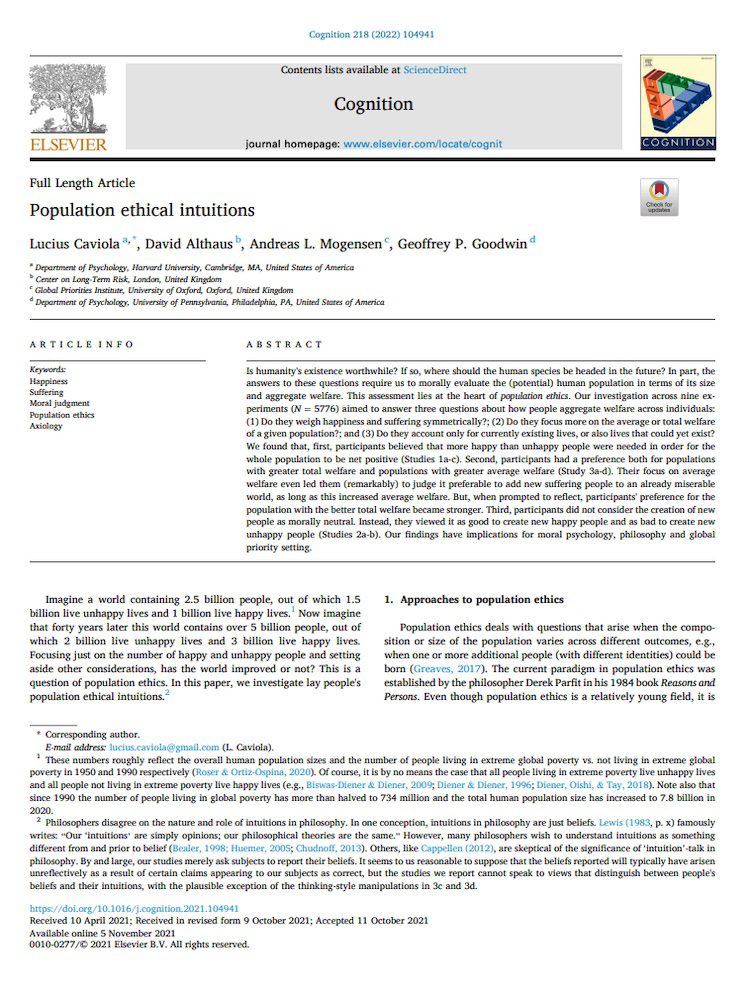Population ethical intuitions
Lucius Caviola (Harvard University), David Althaus (Center on Long-Term Risk), Andreas Mogensen (Global Priorities Institute, University of Oxford) and Geoffrey Goodwin (University of Pennsylvania)
GPI Working Paper No. 3-2024, published in Cognition
Is humanity's existence worthwhile? If so, where should the human species be headed in the future? In part, the answers to these questions require us to morally evaluate the (potential) human population in terms of its size and aggregate welfare. This assessment lies at the heart of population ethics. Our investigation across nine experiments (N = 5776) aimed to answer three questions about how people aggregate welfare across individuals: (1) Do they weigh happiness and suffering symmetrically?; (2) Do they focus more on the average or total welfare of a given population?; and (3) Do they account only for currently existing lives, or also lives that could yet exist? We found that, first, participants believed that more happy than unhappy people were needed in order for the whole population to be net positive (Studies 1a-c). Second, participants had a preference both for populations with greater total welfare and populations with greater average welfare (Study 3a-d). Their focus on average welfare even led them (remarkably) to judge it preferable to add new suffering people to an already miserable world, as long as this increased average welfare. But, when prompted to reflect, participants' preference for the population with the better total welfare became stronger. Third, participants did not consider the creation of new people as morally neutral. Instead, they viewed it as good to create new happy people and as bad to create new unhappy people (Studies 2a-b). Our findings have implications for moral psychology, philosophy and global priority setting.
Other working papers
Critical-set views, biographical identity, and the long term – Elliott Thornley (Global Priorities Institute, University of Oxford)
Critical-set views avoid the Repugnant Conclusion by subtracting some constant from the welfare score of each life in a population. These views are thus sensitive to facts about biographical identity: identity between lives. In this paper, I argue that questions of biographical identity give us reason to reject critical-set views and embrace the total view. I end with a practical implication. If we shift our credences towards the total view, we should also shift our efforts towards ensuring that humanity survives for the long term.
Three mistakes in the moral mathematics of existential risk – David Thorstad (Global Priorities Institute, University of Oxford)
Longtermists have recently argued that it is overwhelmingly important to do what we can to mitigate existential risks to humanity. I consider three mistakes that are often made in calculating the value of existential risk mitigation: focusing on cumulative risk rather than period risk; ignoring background risk; and neglecting population dynamics. I show how correcting these mistakes pushes the value of existential risk mitigation substantially below leading estimates, potentially low enough to…
Minimal and Expansive Longtermism – Hilary Greaves (University of Oxford) and Christian Tarsney (Population Wellbeing Initiative, University of Texas at Austin)
The standard case for longtermism focuses on a small set of risks to the far future, and argues that in a small set of choice situations, the present marginal value of mitigating those risks is very great. But many longtermists are attracted to, and many critics of longtermism worried by, a farther-reaching form of longtermism. According to this farther-reaching form, there are many ways of improving the far future, which determine the value of our options in all or nearly all choice situations…

